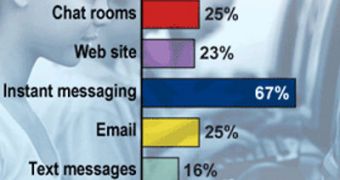Researchers at the Michigan State University (MSU) have determined in a new study that the main cause of computer hacking, online bullying, and other cybercrimes is the fact that children with low self-esteem are pushed into it by their peers.
The behavior is apparently spreading, directly proportional to the extent at which modern technology penetrates the average household. With children allowed unlimited access to computers and cell phones, the online bullying can continue around the clock.
For decades, children who were bullied at school had a reprieve when they got home, but no longer. Now, the malicious behavior continues around the clock, with victims being pounded with email, instant messages and chat room messages well into the night.
The main implication of the new work is that parents should step in and play a more active role in controlling their children's peers and Internet activities. This can lead to bullying being identified and eliminated before the kids get traumatized permanently.
MSU assistant professor of criminal justice Thomas Holt, PhD, the leader of the new study, says that it's “important to know what your kids are doing when they’re online and who they are associating with both online and offline.”
What sets this study apart from others like it is the fact that it focused on cybercrimes committed by middle- and highschool children, rather than by college students. Details of the results appear in the latest online issue of the American Journal of Criminal Justice.
The investigators focused their efforts on a group of 435 students in a suburban Kentucky school district. The immediate conclusion of the study was that kids who had peers that were engaged in cybercrime were very likely to engage in this behavior as well.
Other aspects of cybercrime included digital piracy (illegally downloading music, video and other data), online bullying or harassment, and cyber-trespassing (the most common form is hacking).
“These are the more risk-taking, impulsive kids; they’re more likely to act on opportunity. So understanding your children’s potential for behavior is important as well,” Holt explains.
“Parents need to be more proactive with their kids and discuss these ethical dilemmas to using a computer, such as whether it’s right or wrong to steal music or to download something without paying for it,” he adds.
Holt explains that parents need to be more actively involved in controlling their kids' online behaviors, since most of them can already bypass parental control software that has been installed on their computers, PsychCentral reports.

 14 DAY TRIAL //
14 DAY TRIAL //